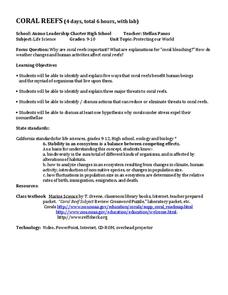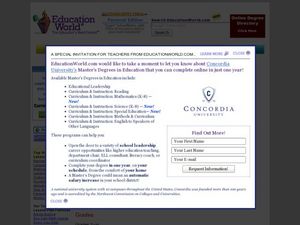Curated OER
WHAT'S ORGANIC?
Learners explore how certain foods come to be certified "organic." They write the words "organic" and "synthetic" and given the definitions of each. Students are given dictionaries. They are asked: "What is organic food?" Learners grow...
Curated OER
Coral Reefs
Young scholars research coral reefs and identify their benefits to humans, threats to the reef, how to reduce and eliminate threats, and more. In this coral reef lesson plan, students research the reefs, and take a field trip to an...
Curated OER
Raising Trout
Students investigate the life cycles of fish as they observe a trout's life in class. In this fish life instructional activity, students create a proper habitat in a fish tank for the trout eggs to spawn and thrive for several weeks....
Curated OER
Captive Breeding and Species Survival
Learners research and assess programs that strive to preserve biodiversity, such as captive-breeding programs and species-survival plans adopted by zoos, aquariums, and other institutions.
Curated OER
Pond Ecology
Fifth graders examine pond ecology, testing how temperature affects the respiration rate of fish. They collect various living things found at a pond, and identify the animal and plant life discovered. They observe a pond community in an...
Curated OER
Exploring Marine Ecosystems in the Caribbean and Maine
Students compare the marine habitats of Maine and the Caribbean using temperature, tides, ocean currents, latitude and longitude. In this marine ecosystems lesson, students analyze maps to complete graphic organizers that evaluate the...
Curated OER
A Fish Talks about Life with a Famous Man or Woman
Students select a famous person they are interested in gathering information about. Using that person and how they made history, they write a story pretending to be a fish in their aquarium. They answer questions given to them by their...
Curated OER
Zoobilation
Students research and use their findings to design a PowerPoint presentation and zoo-type habitat with the correct ecosystem for their animal group using a variety of materials such as cardboard boxes, aquariums etc.
Curated OER
Getting To Know You:learning the Aza Ssp Terminology
Students discover the role zoos play in conservation of animals. They research the captive breeding programs that are in place at the Minnesota Zoo. They use the zoo's website to find the American Zoo and Aquarium Associations criteria...
NOAA
Stressed Out!
Are our oceans really suffering due to the choices humans make? The sixth and final installment in the volume of activities challenges research groups to tackle one of six major topics that impact ocean health. After getting to the...
NOAA
Build Your Own Ocean Ecosystem
Hold the sea in the palm of your hand! Amateur oceanographers work together to create models of an ocean ecosystem in the sixth and final installment in a series. Raise awareness of global ocean health issues through guided research,...
Monterey Bay Aquarium
What's in a Name?
Combine art and word analysis in a activity about genus and species. Elementary children sleuth out the meaning of scientific names for a number of shark species using a prefix and suffix definition chart. They then draw an image of the...
NOAA
Fishy Deep-sea Designs!
Oceans represent more than 80 percent of all habitats, yet we know less about them than most other habitats on the planet. The instructor introduces the epipelagic, mesopelagic, bathypelagic, twilight, and midnight zones in the ocean....
Curated OER
Come On Down!
Begin with an introduction to famous deep-sea submersibles. Learners work in groups to gather information on different vessels and then share with the class. Each group then uses water displacement to help calculate the density of...
Curated OER
Animal Safari on the Internet
Learners verbalize, analyze and practice various research steps including using the Internet for searches and how to use bookmarked sites. They use these skills to research animals.
Curated OER
What Is El Niño?
Students access information at remote sites using telecommunications, identify impacts by reviewing past El Ni??o events, make and use scale drawings, maps, and maps symbols to find locations and describe relationships.
Curated OER
Language Arts: GloFish - Illuminating Essays
Students research the genetically-engineered GloFish and write essays expressing their views about the subject. They evaluate the pros and cons of genetic engineering.Students may also hold a debate about genetic engineering.
Curated OER
Internet Field Trip: Simple Machines
Students research simple machines. In this physics lesson plan, students participate in a WebQuest to gain knowledge about simple machines. WebQuest activities and worksheets are included in this lesson plan.
Curated OER
Interactive Journeys
Students investigate environments and animals through the use of technology while on class field trips. The lesson plan is highly adaptable and can work with any field trip in many subject areas.
Curated OER
Blood Circulation Lab
Learners investigate blood moving in the fin of a fish. In this blood circulation lesson, students use a goldfish wrapped in water soaked absorbent cotton, placed in a large petri dish, then placed until a lighted microscope in order to...
Curated OER
Terrariums: A Look at the Living and Nonliving World
Third graders examine life in a terrarium and relate it to life in a larger environment. In this terrarium instructional activity, 3rd graders examine how living and non-living things work together by examining the changes in a...
Curated OER
Tadpole Diary
Second graders examine the life cycle by observing tadpoles. After reading the book, Tadpole Diary, they draw the stages of tadpole development and write sentences about what they think is happening.
Curated OER
Baby Animals Debut at Zoos
Students determine the names of animal babies, then read a news article about zoo's experiencing animal births. In this current events lesson, the teacher introduces the article with vocabulary activities, then students read the news...
Curated OER
Sea Horse Habitats
Learners research sea horses around the world. In this sea horse habitats lesson, students use the Internet to take a virtual tour of a sea horse in its natural habitat. Learners work in groups to study a geographical region such as...
Other popular searches
- Aquarium Maintainance
- Aquarium Diorama
- Aquarium Field Trip
- Monterey Bay Aquarium
- Aquarium Maintenance
- Special Needs Aquarium
- Marine Aquariums
- Aquarium Trip
- Aquarium Ecosystem
- Salt Water Aquariums
- Fish Aquariums
- Aquariums Field Trip

























